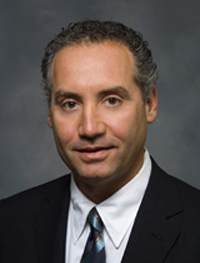 Edward Reines (at left), a partner at Weil, Gotshal & Manges, frequently argues before the Federal Circuit and is chair of the court's Advisory Council. Prepared remarks for Judge Wood's Sept. 26 talk at the Illinois Institute of Technology Chicago-Kent College of Law can be downloaded here.
Edward Reines (at left), a partner at Weil, Gotshal & Manges, frequently argues before the Federal Circuit and is chair of the court's Advisory Council. Prepared remarks for Judge Wood's Sept. 26 talk at the Illinois Institute of Technology Chicago-Kent College of Law can be downloaded here.
The Chief Judge of the U.S. Court of Appeals for the Seventh Circuit, Diane Wood, recently delivered a speech provocatively titled "Is It Time to Abolish the Federal Circuit's Exclusive Jurisdiction in Patent Cases?" While it is trendy to criticize the patent system, Judge Wood's prominence and her colorful critique have raised eyebrows. Frequently mentioned as a potential Supreme Court nominee, Judge Wood's far-reaching proposal deserves close consideration -- and honest rebuttal.
The judge's focus on the Federal Circuit is understandable. Although historically patent law was considered an esoteric backwater, it is now recognized as a dynamic legal field involving fascinating subjects and great financial stakes. Our world is filled with amazing new inventions that improve the way we work, how we are entertained, and our healthcare. Patent appeals now attract the finest advocates and garner national media attention. In many ways, the Federal Circuit's patent docket has become the envy of the system.
Judge Wood did not mince words in advancing her proposal to redistribute patent appeals back to the regional circuits. In her live remarks, she critiqued the Federal Circuit for a lack of "intellectual ferment," highlighted the frequency of Supreme Court review, and described the court as too "specialist." She proposed a dual jurisdiction system, allowing appellants to elect between the Federal Circuit and the regional circuits, with the Judicial Panel on Multidistrict Litigation resolving conflicts by lottery.
The meteoric rise of technology, to be sure, has tested the patent system. The Patent Office's inability to cope with the deluge of applications is well documented. Patent assertion abuses, especially by so-called trolls, plague the system. But are Judge Wood's criticisms of the Federal Circuit itself valid?
Judge Wood suggests that having eleven regional circuits join the Federal Circuit in addressing patent law would add intellectual heft and avoid group think. She theorizes that the Federal Circuit's culture of consistency stifles the freedom the regional circuits would have to make "big mistakes" that might advance patent law.
The Federal Circuit was created in 1982, after studies showed that the regional circuits' handling of patent appeals was dysfunctional. Renowned Second Circuit Judge Henry Friendly criticized the "mad and undignified" race to the courthouse stemming from regional circuit management of patent appeals. A study cited by Judge Wood reported that patents in the Eight Circuit suffered an 88.8 percent invalidity rate -- meaning virtually all patents were ruled invalid. It is doubtful that a return to such a free-for-all would raise the quality of discourse.
In contrast to Judge Wood's concerns about Federal Circuit unanimity, the bar of the court often complains that each judge holds independent views, creating too much panel-to-panel variability. If those from afar consider a court's jurisprudence too uniform, and those up-close consider it too diverse, the likelihood is that the court has struck about the right balance.
Judge Wood's critique of the Federal Circuit based on the rate of Supreme Court review is in tension with her suggestion that it deserves a worthy counter-weight. On the big issues, such as whether genetic tests may be patented, the Supreme Court has not been shy about its role. And although the Supreme Court has historically heard as many as 20 Federal Circuit cases per term, more recently it has only decided a handful per term. It is capable of addressing any perceived Federal Circuit bias.
The portrayal of the Federal Circuit as too "specialist" overlooks the varied docket of the court, which includes veterans' appeals and trade disputes. It also underrates the rich diversity and high caliber of the judges on the court. This includes generalists with backgrounds as respected Supreme Court advocates and high-performing federal trial judges. Of President Obama's six Federal Circuit appointees, only one is a patent expert, former Patent Office star Ray Chen, who would elevate the performance of any circuit.
Judge Wood's proposal to reintroduce the regional circuits to patent appeals is, respectfully, impractical. It would give litigants an incentive to race to appeal to obtain their preferred circuit law. Trial courts would not know if they were governed by Federal Circuit or regional circuit patent law when they made decisions. Simply put, adding the option of regional circuits to the Federal Circuit would worsen the unacceptable pre-1982 forum shopping.
Finally, the idea of using the MDL panel to select the appeal court by lottery is dubious. Judge Wood cites existing uses of this scheme. But it has only been sparsely used in niche areas. One real-world example provides a cautionary tale: In an attempt at forum shopping, appeals were filed in 11 different regional circuits including the D.C. Circuit. The MDL panel selected the Eighth Circuit by lottery. The Eighth Circuit then transferred the appeal back to the D.C. Circuit. Given the fast pace of patent litigation, such appellate roulette would be intolerable.
In the end, calls to return patent appeals to the regional circuits cannot survive study of the pre-Federal Circuit mess. A hybrid system with the Federal Circuit and the regional circuits competing for jurisdiction, while imaginative, would be a big mistake. The Federal Circuit has presided over a technology boom like no other. We know from hard-worn experience that the grass is not greener on the other side.
The above article was originally published on October 7, 2013 in The Litigation Daily, and is being reprinted here with the author's permission.